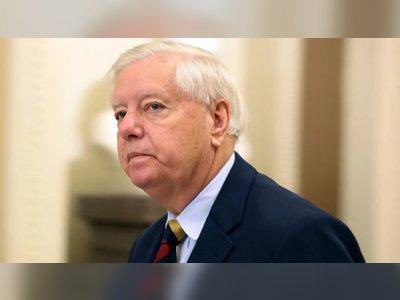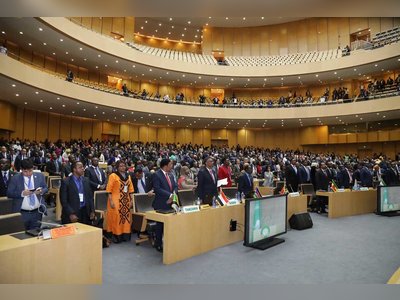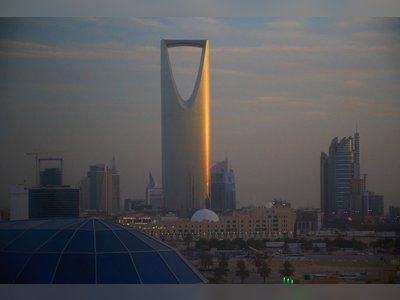
Health rumours leave Palestinians wondering who will follow Abbas
Before a planned meeting with US President Joe Biden on Friday, Palestinian President Mahmoud Abbas has been back in the public eye in recent weeks, making appearances at events, including a trip to Algeria earlier in July, where he had a rare meeting with the leader of his Palestinian rival Hamas, Ismail Haniya.
The images of the 87-year-old leader have softened rumours last month that Abbas was seriously ill, but questions remain.
Abbas, who has spent 17 years as president of the Palestinian Authority (PA), has previously had prostate cancer, which he has recovered from, and has had two cardiac catheters in the last 10 years. He has received medical treatment across the world, in Jordan, Germany and the United States.
A high level of secrecy surrounds information regarding Abbas’s health status.
Abbas’s health condition has raised local, regional and international concerns, as the question of who will succeed the Palestinian president remains.
“We are concerned seeing how the Palestinian Authority handled the rumours earlier this month; there was a lack of transparency, leaving everything open for rumours and conspiracy theories,” a senior international diplomat working in the occupied West Bank, who did not wish to be named, told Al Jazeera, “I am worried about the West Bank; I see Hebron, Nablus and Jenin not looking good, and I would worry about possible chaos, and then if Israel decides to intervene more forcefully, there could be much violence.”
Abbas’s succession has also become a critical issue for his inner circle, in light of the intensification of the competition between the leaders of Fatah, the party Abbas leads.
What happens when the president’s chair becomes vacant is unclear – presidential elections may mean a win for Fatah’s rivals, Hamas.
Elections present a whole host of other problems too; Palestinians resident in occupied East Jerusalem are unable to participate, as Israel will not let them, and the legacy of the 2007 fighting between Fatah and Hamas, which resulted in Fatah dominance over the West Bank and Hamas in control of Gaza, also complicates matters.
“The Fatah-Hamas divide and the Jerusalem issue make it difficult to hold elections or have a smooth legal transition of Abbas’s authorities to his successor,” said Ghassan al-Khatib, a Palestinian political analyst and vice president of Birzeit University. “People are worried about what might result from the vacancy of the president’s position, and other Palestinian leaders disagree more than they agree.”
Former Palestinian Foreign Minister Nasser al-Kidwa blamed weak Palestinian institutions for the predicament.
“If the institutions – the Palestinian Authority and the Palestine Liberation Organisation – had remained strong, there would be no concern,” al-Kidwa told Al Jazeera. “After [former Palestinian President] Yasser Arafat passed away in 2004, there was a Palestinian Legislative Council, Palestinian National Council and the rule of law. Now there is no law, and no institutions, which is why people are worried.”
“There is no alternative to holding elections to choose the next president,” he added.
Potential candidates
The results of a public opinion poll conducted in late June by the Palestinian Center for Policy and Survey Research in Ramallah suggest a significant drop in Abbas’s support, and increased calls for him to step down.
If presidential elections were held, with Abbas and Haniya as the candidates, only 49 percent of the respondents to the poll said they would turn out to vote, with Haniya the choice of 55 percent of those who would, and Abbas only attracting the support of 33 percent.
Other Fatah grandees, such as Palestinian Prime Minister Mohammed Shtayyeh and Mohammed Dahlan would also lose out to Haniya.
However, there is one Fatah figure who has support – the imprisoned Marwan Barghouti.
Barghouti, who is serving five life sentences in an Israeli prison after being convicted in 2004 of “terrorism”, beat Haniya in the poll 61 percent to 34, and increases the turnout to 66 percent, showing his popularity.
Barghouti is regarded as a leader of the first and second Palestinian intifadas, and has remained popular despite being behind bars.
Barghouti’s younger brother, Muqbil, confirmed to Al Jazeera that Barghouti planned to run for the presidential election whenever it is held.
However, it is uncertain that the 63-year-old will be released by the Israelis as his popularity among Palestinians, and the potential rallying effect around him, is worrying for Tel Aviv.
The Israeli position
The question of Abbas’s successor is an issue of concern for Israel, which worries that Hamas may be able to take advantage.
“There is great concern among the Israeli security and military services about what might happen after Abbas,” said David Hacham, the former adviser for Arab affairs at the Israeli Ministry of Defence. “The security and military establishment have developed several scenarios, the most dangerous of which is the occurrence of an armed conflict between the contenders for Abbas’s succession, which leads to a state of security instability in the Palestinian territories.”
At the same time, Israel has decided to not show any public support for any particular candidate, in the knowledge that any backing will do more damage to the candidate than good.
The reality is, however, that Israeli backing for any candidate would convince the US to support the figure, and encourage the support of Arab states too.
A Hamas candidate, on the other hand, is one the Israelis would certainly not support. The movement’s win in the 2006 Palestinian legislative elections led to economic sanctions from Israel, the US, and others.
Bassam Naim, a prominent member of the group, told Al Jazeera that his movement called for free presidential and legislative elections that would enable the Palestinian people to choose their future president, and a leader capable of resolving the conflict with Israel.
However, Naim was not willing to go any further than that.
“Hamas may nominate a figure for the Palestinian presidency if presidential elections are organised,” Naim said. “But talking about the Hamas leadership’s decision in this regard is premature at the moment.”




